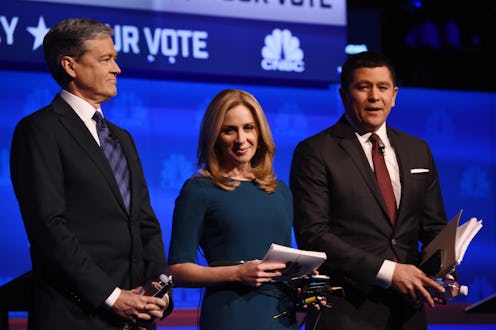News
5 Lessons For Moderators From CNBC’s Disaster
The fourth GOP presidential debate will be taking place on Tuesday, and it figures to be another heavily viewed, contentious affair. Since the last showdown, which was hosted by CNBC and received nearly universally poor reviews, there's a lot riding on the debate for its presenters, the Fox Business Network and The Wall Street Journal. And if they're looking to draw some inspiration, here's a tip: don't do it the way the last crew did. Here are 5 lessons Republican debate moderators can learn from CNBC's disastrous turn in the spotlight.
The last debate, which took place at the University of Boulder in Colorado, wasn't much for subtlety or nuance, and that came as something of a surprise — in the run-up to the debate, CNBC made a bit of noise about how much more substantive and policy-driven theirs would be.
And yet, when it came time to actually watch the whole thing, it was impossible not to notice what a mess things were: candidates talking over the moderators, moderators getting bossed around and denounced, inane questions that added nothing to the experience, the whole nine yards. Here are five takeaways from the way it all went down that future moderators should bear in mind.
1. Get Things Started On Time
First impressions are important, and this was a place where CNBC did themselves no favors — the debate was about 15 minutes late getting started, during which viewers had to watch CNBC's panelists twist in the wind aimlessly, barreling through the delay with paper-thin banter and analysis. It was not a promising way to start, and it ended up being a harbinger.
2. Exude Confidence
If there's one thing that'll get you stung as a moderator, it's letting the candidate see you sweat. In a Republican debate — and even sometimes a Democratic one — turning the question back on the moderator is a tested way to wriggle free from a sensitive topic. And if the politicians sense weakness or indecision, order can break down.
This was more or less what happened when CNBC's moderators. At various points during the CNBC debate, as Talking Points Memo observed, the candidates and moderators were occasionally engaged in free-firing crosstalk over each other, creating a chaotic atmosphere that was almost impossible to decipher.
3. "You Gonna Let Him Say That?" Is Not A Real Question
It was the question that set up Mike Huckabee for perhaps his best-delivered debate line of the night, and no matter what you think of him, it was hard to argue. When it was Huckabee's turn to answer a question from CNBC moderator John Harwood, this was what he got:
The leading Republican candidate, when you look at the average of national polls right now, is Donald Trump. When you look at him, do you see someone with the moral authority to unite the country?
Huckabee's response, predictably, was to attack the triviality of Harwood's question, and he even dropped a little joke in there about "wearing a Trump tie."
In simplest terms, Harwood's question's was "hey, this controversial guy we're all focused on, isn't he controversial?" If Harwood had included some kernel of policy in there, it'd be one thing, but nakedly urging the candidates to attack each other doesn't serve any public good.
4. Remember: Trump Will Deny Anything ...
Donald Trump will never back down, will never apologize, and will never cop to having done or said anything wrong. Any and all moderators need to understand and anticipate that. It's not going to be enough to simply ask him "hey, was that over the line?" You have to be prepared for, well, any of the following:
- Flat denial of something demonstrably true.
- Insistence he's being treated unfairly.
- Lashing out at the questioner.
- Bullying tactics designed to get the audience on his side.
5. ... So Have Your Follow-Ups Ready
During the debate, when moderator Becky Quick asked Trump about his criticisms of Marco Rubio — specifically, that Trump had called Rubio "Mark Zuckerberg's personal senator" over his position on H-1B visas — Trump denied it, firmly insisting "I never said that. I never said that."
His confidence seemed to put Quick on her heels, and her response betrayed a doubt over whether she had the facts right: "So this is an erroneous article the whole way around? … My apologies, I'm sorry."
However, as PolitiFact detailed following the debate, Quick was wrong to apologize. In fact, those very words about Rubio and Zuckerberg weren't from some fallacious article — they were from Trump's own campaign website. Because of Quick's apologetic response, some viewers could've walked away under the mistaken impression that Trump was right. That's a fairly common tactic in political debates: say what you need to say to survive in front of the cameras, and clean up any resulting messes later.
Luckily, Quick came back to the issue before the debate was over, confronting Trump with the reality of where those words came from, but she didn't really hold his feet to the fire about his earlier denials, instead asking him to clarify what he thought about H-1B visas. It's important not to lose the moment like this — when the denial comes in, the obvious follow-ups need to be prepped and ready.
